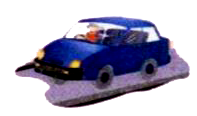A man covvers a distance olf miles at a speed of s miles per hour and another distance , D at 3 s miles per hour. If D>2d, and the man makes the entire journey within 2 hours , and d<ks , what is the value of K ?
To solve the problem step by step, we will analyze the information given and derive the necessary equations.
Step 1: Define the variables and equations
Let:
- d = distance covered at speed s miles per hour.
- D = distance covered at speed 3s miles per hour.
From the problem statement, we know:
1. The time taken to cover distance d at speed s is given by:
t1=ds
2. The time taken to cover distance D at speed 3s is given by:
t2=D3s
Step 2: Total time for the journey
The total time for the journey is given as 2 hours, so we can write:
t1+t2=2
Substituting the expressions for t1 and t2:
ds+D3s=2
Step 3: Simplify the equation
To eliminate the denominators, multiply through by 3s:
3d+D=6s
Rearranging gives:
D=6s−3d(Equation 1)
Step 4: Use the inequality condition
We are given that D>2d. Substituting Equation 1 into this inequality:
6s−3d>2d
Rearranging gives:
6s>5d
Thus:
d<6s5(Equation 2)
Step 5: Relate to the condition d<ks
We are also given that d<ks. From Equation 2, we can compare:
6s5<ks
Dividing both sides by s (assuming s>0):
65<k
Step 6: Conclusion
Thus, the value of k must be:
k=65
Final Answer
The value of k is 65.
---
Let:
- d = distance covered at speed s miles per hour.
- D = distance covered at speed 3s miles per hour.
1. The time taken to cover distance d at speed s is given by:
t1=ds
2. The time taken to cover distance D at speed 3s is given by:
t2=D3s
The total time for the journey is given as 2 hours, so we can write:
t1+t2=2
Substituting the expressions for t1 and t2:
ds+D3s=2
To eliminate the denominators, multiply through by 3s:
3d+D=6s
Rearranging gives:
D=6s−3d(Equation 1)
We are given that D>2d. Substituting Equation 1 into this inequality:
6s−3d>2d
Rearranging gives:
6s>5d
Thus:
d<6s5(Equation 2)
We are also given that d<ks. From Equation 2, we can compare:
6s5<ks
Dividing both sides by s (assuming s>0):
65<k
Thus, the value of k must be:
k=65
The value of k is 65.
Similar Questions
Juan bikes halfway to school at 9 miles per hour, and walks the rest of the distance at 3 miles per hour. What is Juan's average speed for the whole trip?
View SolutionArun is walking at a speed of 6 km per hour. Find the: a. distance Arun will cover in 2 hours. b. time Arun will take to cover 4 km.
View Solution
Knowledge Check
A cyclist travels 20 miles at a second of 15 miles per hours. If he returns along the same path and the entire trip takes 2 hours, at what spped did he return?
A15 mphB20 mphC22 mphD30 mphA man drove to work at an average rate of speed of 60 miles per hour and returned over the same route driving at an average rate of speed of 40 miles per hour. If his total driving time was 1 hour, what was the total number of miles in the round trip?
A12B24C30D48Kayla drove from Bayside to Chatham at a constant speed of 21 miles per hour and then returned along the same route from Chatham to Bayside. If her average speed for the entire journey was 26.25 miles per hour, at what average speed, in miles per hour, did Kayla return from Chatham to Bayside ?
A28B31C31.5D35
A cheetah ran 12 miles at an average rate of 50 miles per hour and then ran the next 12 miles at an average rate of 43 miles per hour. What was the average speed, in miles per hour, of the cheetah for the 24 miles ?
View SolutionAmit covered a distance of 50 km in 123 hours. At what speed is he driving his car?

View SolutionAn elephant traveled 7 miles at an average rate of 4 miles per hour and then traveled the next 7 miles at an average rate of 1 mile per hour. What was the average speed, in miles per hour, of the elephant for the 14 miles?
View SolutionBrian plans to complete a 100-mile bike race for charity. According to his registration materials, he will need to ride at an average speed of 12.5 miles per hour if he wants to complete the course before it closes. On a pratice ride the week before the race, Brain rides 60 miles and trackes his speed. For the first 30 miles, his average speed is 16 miles per hour, and for the next 30 miles, his average speed is 15 miles per hour. If Brian can match these speeds for the first 60 miles of the charity race, then he rests for that total of 1 hour after that, what approximately speed must he maintain for the last 40 miles in order to complete the ride on time?
View SolutionA man drove a car at an average rate of speed of 45 miles per hour for the first 3 hours of a 7-hour car trip. If the average rate speed for the entire trip was 53 miles per hour, what was the average rate of speed in miles per hour for the remaining part of the trip?
View Solution
